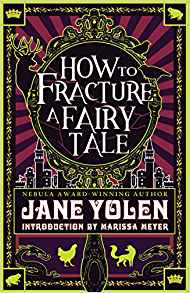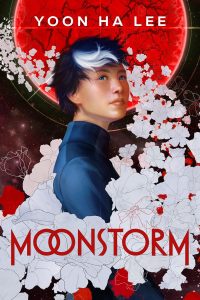Alex Brown Reviews Abeni’s Song by P. Djèlí Clark
 Abeni’s Song, P. Djèlí Clark (Starscape 978-1-25082-582-7, $17.99. 336pp, hc) July 2023. Cover by Michael Machira Mwangi.
Abeni’s Song, P. Djèlí Clark (Starscape 978-1-25082-582-7, $17.99. 336pp, hc) July 2023. Cover by Michael Machira Mwangi.
P. Djèlí Clark makes his middle grade debut with Abeni’s Song, the first in a new fantasy trilogy, and it is everything you’d expect from Clark, and then some.
The morning of Abeni’s 12th birthday begins with excitement. In her mother’s golden wrap and with fresh oils rubbed into her skin, she rushes out to join her friends. Her birthday is the same day as her village’s Harvest Festival, and in one year’s time she’ll be with the older girls beginning their rites of adulthood. But, for now, she plays. Or she would, but a dark fog surrounds her village and the old witch who lives in the forest arrives with a dire warning: something evil is coming. Abeni and her friends wonder if this great threat that has apparently been ravaging the lands beyond the forest has something to do with the strange dream they all had last night of children being stolen away by a song.
Before Abeni can figure out the mystery, her village is attacked by demon-like warrior women with snake-like ropes that drag their victims into the fog. With the help of the old witch, who Abeni learns is called Auntie Asha, they escape, but the danger is far from over. Abeni learns to fight and how to use the witch’s magical objects, but even that is not enough to protect her from the monsters hunting her. A brutal attack leaves Auntie Asha in the form of a child, vulnerable and unable to wield her great powers. Once again, Abeni finds herself without a home or adults to guide her. She and Asha set out on a long journey to find Asha’s sister. They’ll need all the help they can get to save Abeni’s friends and family from the Storm Women who stole them away and the Goat Man who commands an army of monsters. Fortunately for Abeni, she makes friends easily, and soon she and her animal spirit companions are ready to fight back.
Clark draws mostly from West African cultures, but if you’re paying attention you’ll pick up bits from other regions in Africa, as well as folklore and traditions from the diaspora – particularly Afro-Latinx, Afro-Caribbean, and African American. That said, Clark sets his story in a completely fictional world. This is not a fantasy version of West Africa but a fantasy world with West African influences. Black kids reading this book will certainly recognize the parallels with slavery in the real world, but Clark adds enough layers of magic onto it that it doesn’t feel like a lecture or a history lesson. One child and her gaggle of magical friends cannot stop the global slave trade on their own, nor does Clark set Abeni up as the Chosen One who is expected to. What she can do is work with her people and use the skills she has to stand up for what’s right. She cannot unmake the terrible things happening in the world, but she can choose to resist. The real power of this novel is community.
Clark’s novel reminds me a lot of the Black children’s fiction I used to read as a kid. Back in ye olden days, there were few books for Black children with Black protagonists written by Black authors. Living in an extremely white area (by the time I was seven, my mom and I were two of only 100 Black people living in my city of over 60,000 residents, almost all of whom were white) before the days of the internet meant we couldn’t easily access what little Black children’s fiction there was. Thank goodness for relatives in majority-Black areas who mailed me Golden Legacy Black history comic books, The People Could Fly and other African and African American folktale collections, Julian’s World books, and The Shimmershine Queens, among others. Today, Black kids have a lot more options than I did, but Abeni’s Song still feels fresh and unlike anything else. It’s straightforward, fun, and wholly Black-centric while also imbued with messages about our culture, history, and traditions.
I did find some chapters to be overly long, and there were several moments where I wished we’d gotten to read the dialogue of what was happening instead of just getting a block of text describing it. Are these structural problems? No, more like stylistic choices that didn’t always work for me. I expect adults will find more things to gripe about, but kids probably less. Most kids will either not notice any issues or if they do, they probably won’t be bothered by them. When I was that age, my favorite stories were the ones where kids wandered around fantasylands meeting strange creatures while the main plot took a back seat for big stretches. That’s exactly what this novel is. If I’d had Abeni’s Song when I was twelve, I would have never put it down.
Anyone can read P. Djèlí Clark’s Abeni’s Song and get something out of it, but Black children are especially going to be drawn to it. It would make a great book for children who love fantasy, adventure, and found family stories.
Alex Brown is a librarian, author, historian, and Hugo-nominated and Ignyte award-winning critic who writes about speculative fiction, young adult fiction, librarianship, and Black history.
This review and more like it in the July 2023 issue of Locus.
 While you are here, please take a moment to support Locus with a one-time or recurring donation. We rely on reader donations to keep the magazine and site going, and would like to keep the site paywall free, but WE NEED YOUR FINANCIAL SUPPORT to continue quality coverage of the science fiction and fantasy field.
While you are here, please take a moment to support Locus with a one-time or recurring donation. We rely on reader donations to keep the magazine and site going, and would like to keep the site paywall free, but WE NEED YOUR FINANCIAL SUPPORT to continue quality coverage of the science fiction and fantasy field.
©Locus Magazine. Copyrighted material may not be republished without permission of LSFF.






